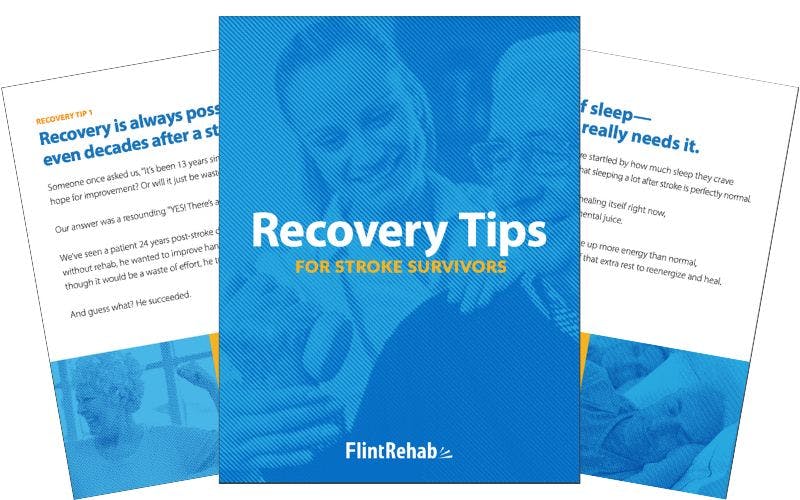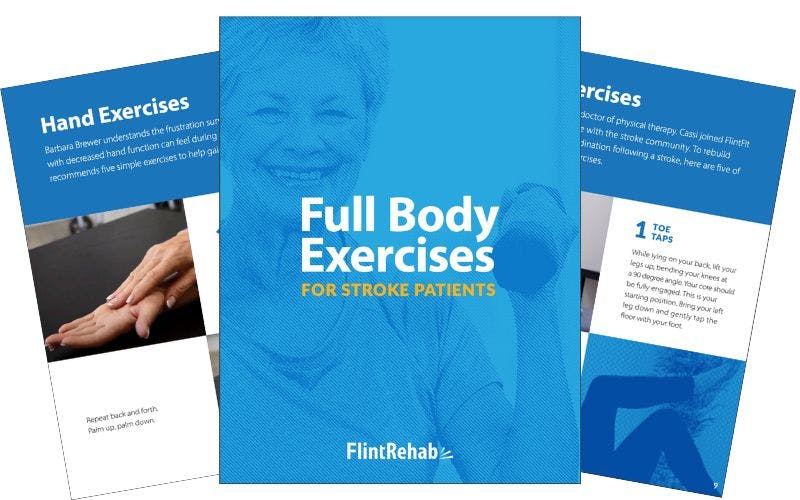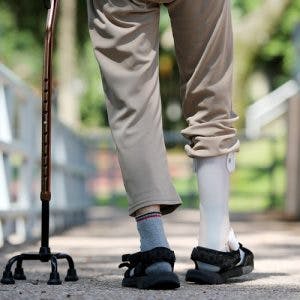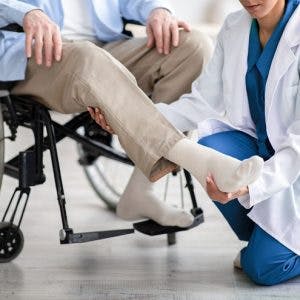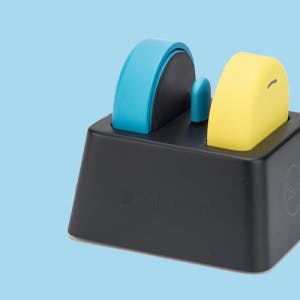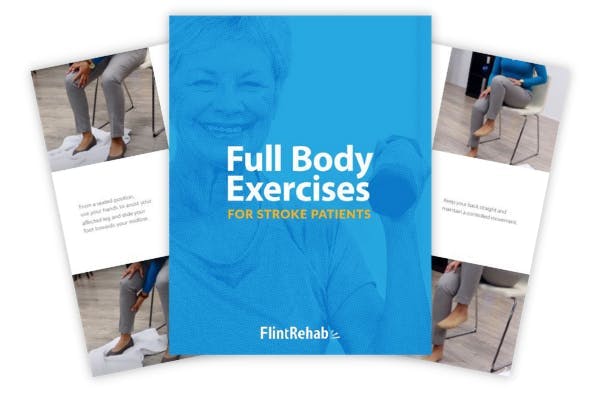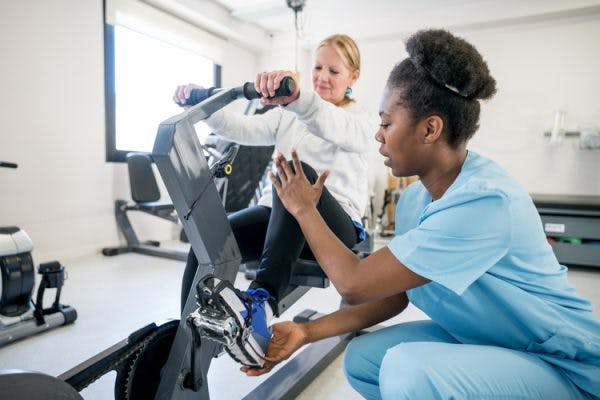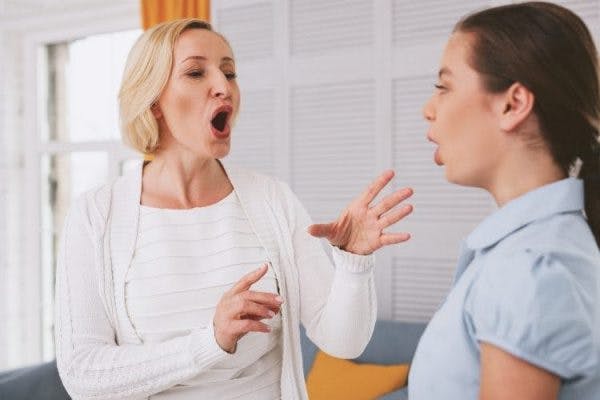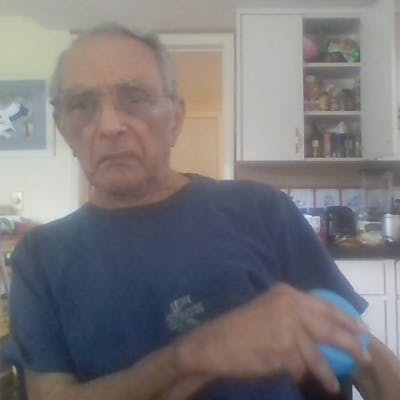Global aphasia is the most severe type of aphasia caused by extensive damage to the areas of the brain associated with language. Although global aphasia may be frustrating for the individual experiencing it and their loved ones, there is hope for regaining communication skills.
This article will examine the causes and symptoms of global aphasia, as well as outline possible treatment and recovery techniques. Use the following links to jump directly to a specific section:
- Causes
- Symptoms
- Is Aphasia Permanent?
- Importance of Neuroplasticity
- Approaches to Rehabilitation
- Therapeutic Techniques
- Communication Tips for Loved Ones
Causes of Global Aphasia
Global aphasia is caused by extensive damage to multiple areas of the brain involved in language, including both Wernicke’s area and Broca’s area. While there are other areas of the brain involved in language, these two areas play a crucial role in understanding and producing language, respectively. Wernicke’s area and Broca’s area are found in the dominant side of the brain which, for most people, is the left hemisphere.
Neurological conditions that may cause global aphasia include stroke, traumatic brain injuries, brain tumors, and infections, such as meningitis. In cases of global aphasia after stroke, the areas of the brain supplied with blood by the middle cerebral artery are often damaged, including Wernicke’s area and Broca’s area.
Symptoms of Global Aphasia
Global aphasia can cause symptoms that affect every aspect of a person’s language skills. For example, a person with global aphasia may experience:
- Difficulty speaking in complete sentences
- Trouble repeating speech
- Frequent grammatical mistakes
- Using the incorrect words or phrases
- Trouble understanding others
- Needing more time to understand spoken words
In addition, individuals with global aphasia usually cannot read or write. Sometimes they can answer basic yes or no questions, but in many cases that skill has also been lost. Some individuals can also communicate in automatic phrases such as “excuse me”, but more complex phrases are often too difficult.
However, individuals with global aphasia often retain their non-verbal communication skills, such as facial expressions, gestures, and tone of voice. Using these skills can allow individuals to communicate while they are working on rehabilitating language skills.
Is Aphasia Permanent?
Occasionally, global aphasia is only temporary and can last anywhere from a few hours to a few weeks. This is known as transient global aphasia.
Severe migraines, seizures, and concussions are the most common causes of transient aphasia. Mini strokes (also known as transient ischemic attacks) are temporary blood clots in the brain that can also cause short-term aphasia.
Transient global aphasia will fade once the brain has had a chance to recover. If, however, global aphasia was caused by a severe stroke or brain injury, it may require intensive treatment to recover the ability to effectively produce and comprehend language.
Importance of Neuroplasticity
Fortunately, the brain possesses a remarkable ability to bounce back from injury by rewiring itself to compensate for damaged brain tissue. This ability to create and strengthen neural pathways is referred to as neuroplasticity.
Even if a stroke severely damages the brain regions that are normally involved in language, it is still possible for other areas of the brain to compensate. Neuroplasticity is activated by consistent and repetitive practice of tasks involving targeted skills. Therefore, rehabilitation for global aphasia relies upon repetition to spark neuroplasticity and rebuild the skills of language expression and comprehension.
It is ideal to pursue rehabilitation as soon as possible for optimal improvements. This is because the brain enters a state of heightened neuroplasticity for the first few months after injury, allowing more rapid improvements to be made.
While those who have less severe aphasia after a stroke are more likely to experience early recovery of language skills, it has been shown that participating in early intervention for post-stroke aphasia can maximize improvements. Therefore, it is highly recommended to pursue early rehabilitation.
However, individuals may still be able to make improvements even decades after stroke. In one case study, a man with global aphasia continued to improve his language skills more than 20 years after his stroke. With this in mind, it is never too late to pursue rehabilitation.
Approaches to Rehabilitation for Global Aphasia
Recovering from global aphasia may be more difficult than recovering from other types of aphasia, but it is still possible. The best way to overcome aphasia is through speech therapy.
Speech-language pathologists, also known as speech therapists, are able evaluate speech, language, and cognitive skills. Depending on which skills are affected, a speech therapist can then recommend exercises tailored to an individual’s needs and ability level. When practiced on a regular basis, speech therapy exercises can activate neuroplasticity, allowing individuals to regain lost or impaired skills.
Because of the severity of language deficits among those with global aphasia, it is highly encouraged that individuals also focus on optimizing their current communication skills. Referred to as compensatory techniques, improving social skills unrelated to language can help improve communication using existing abilities.
Although individuals may not regain their ability to verbally express themselves or comprehend language effectively through this approach to therapy, it can greatly improve the individual’s ability to interact with others.
Therapeutic Strategies to Address Global Aphasia
While there is not an abundance of research regarding the best treatments for global aphasia, there are a few therapeutic strategies that are often recommended. In addition to practicing speech therapy exercises, therapeutic strategies for addressing global aphasia may include:
Music Therapy
Participating in music therapies, such as Melodic Intonation Therapy, may help individuals with aphasia improve their expressive language skills. While language skills are generally stored in the left hemisphere of the brain, musical skills are housed in the more creative right side of the brain.
Therefore, even though individuals with aphasia may be unable to speak, they may still be able to use skills stored in the intact right hemisphere of the brain to sing. As individuals improve their verbal expression through singing, they may eventually be able to regain the ability to speak without singing.
Transcranial Magnetic Stimulation
Transcranial magnetic stimulation (TMS) is a non-invasive technique in which a powerful current is passed through a magnetic coil, creating a magnetic field that stimulates the brain. When used in conjunction with speech therapy, this technique may boost neuroplasticity and enhance language skills.
In fact, a 2019 study found that using repetitive TMS alongside conventional speech therapy resulted in improved auditory comprehension, spontaneous speech, and repetition skills in individuals with global aphasia. Although the best areas of the brain to stimulate using TMS are still being determined, results have been promising.
Life Participation Approaches to Aphasia
According to a 2021 study, there has been a relatively new focus on Life Participation Approaches to Aphasia (LPAA) therapy. The goal of this therapeutic framework is to improve quality of life by encouraging individuals with aphasia to reintegrate into their communities.
Like other compensatory techniques, LPAA focuses on optimizing an individual’s strengths rather than focusing on improving their language difficulties. It may include determining which communication skills are still intact and using these skills to practice individualized communication strategies with a loved one.
Aphasia groups or centers also fall within the realm of LPAA, as these create opportunities for individuals with aphasia to interact with others in the community, develop positive relationships, and practice conversation skills. Although language skills may not significantly improve with this therapeutic approach, it is highly recommended due to its ability to improve quality of life among those living with global aphasia.
Home Programs
To improve language skills, it is ideal to practice speech therapy daily, possibly even multiple times each day. This provides the brain with the intensive stimulation it needs to rewire itself, optimizing the chances of regaining language skills.
Since individuals often receive speech therapy only a once or twice each week, it is essential to continue practicing speech therapy exercises at home. While many speech therapists provide written home programs, some may recommend using speech therapy apps.
These programs are often interactive and motivating, encouraging individuals to practice their speech and language skills more consistently. Some apps, such as the CT Speech & Cognitive Therapy App, can even automatically adjust the intensity of exercises in order to provide exercises tailored to one’s current ability level.
Because global aphasia is often a severe condition, it is recommended to use speech therapy apps with the guidance of a speech therapist. Whether using an app or a written home program, staying engaged between speech therapy sessions can maximize improvements.
Want to learn more about the CT Speech and Cognitive Therapy App? Get Started Here.
(Link opens a pop-up for uninterrupted reading.)
Tips for Communicating with Individuals with Global Aphasia
While individuals with global aphasia may not be able to effectively verbalize their thoughts or comprehend what others are saying, they often still desire social interaction. Therefore, living with global aphasia can be a very isolating experience. Global aphasia does not affect one’s intelligence, so most individuals with aphasia are aware of when they are being treated differently.
The following tips may help improve interactions with individuals who have global aphasia:
- Speak slowly using simple sentences at a normal volume, without “talking down” to the person
- When asking a question, try to provide choices or use “yes/no” style questions
- Give the individual time to express themselves without jumping in
- Rely on non-verbal communication as needed, including the use of gestures, drawings, and facial expressions
- Minimize distractions
Talk to a speech therapist for more helpful tips on how to communicate with someone with global aphasia. Loved ones may even be able to participate in therapy sessions focused on learning how to communicate more effectively.
Overcoming Global Aphasia
Global aphasia occurs after extensive damage to the language centers of the brain. It affects every aspect of a person’s communication abilities, from speaking and understanding others to the ability read and write.
Intensive therapy using both rehabilitative and compensatory techniques can help individuals improve communication skills. By working with a speech therapist, individuals with global aphasia can learn the most effective strategies to improve both communication and quality of life.


